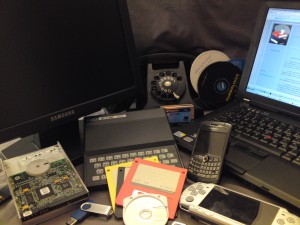The Internet Kill Switch
Have you heard of an Internet Kill Switch? After reading what Jill posted on Facebook, about Woody Allen, stating that President Obama should be granted Dictatorial powers; I started to seriously consider, how people would feel about the President having access to an Internet Kill Switch.
The Internet Kill Switch would shut down the Internet. That would mean that your computer would not be able to communicate anymore with the outside world. Could you imagine? Would this even be possible?
Originally, the idea of the Internet Kill switch came from a bill which was sponsored by Sen. John Rockefeller (D-WV), chairman of the Senate Committee on Commerce, Science, and Transportation, and Sen. Olympia Snowe (R-Maine). The bill gave power to the President to be able shut down, or kill the Internet. The President would be able to shut down any assets that belong to the Federal government or, and this is the dangerous part, infrastructure information systems or networks in the United States that he considers would be in the interest of national security. Rockefeller had also put forward, that online services, and private sector infrastructure, could include airlines, railways, banking and utilities. Basically, a dictatorship, hmm . . . has he been talking to Woody Allen? Seriously, the President would have had the power to order private companies to disclose information and take control of their networks, if he deemed them to be critical to the national interest.
The original bill caught the attention of many people, who were outraged by the idea of what we know to be the largest source of free flowing information. The bill was changed to include some of the findings below, and it is now known as; The Cybersecurity Act of 2010.
1. “As a fundamental principle, cyberspace is a vital asset for the nation and the United States should protect it using all instruments of national power, in order to ensure national security, public safety, economic prosperity, and the delivery of critical services to the American public.”
Cyberspace is considered an asset, this statement can include anything. What is cyberspace?
2. President Obama has rightfully determined that ‘‘our digital infrastructure-the networks and computers we depend on every day will be treated as a strategic national asset.”
Our digital infrastructure includes the gas pump that just takes my credit card without an attendee to my Sunpass, the Florida electronic tracking device for cars, no I am joking, the prepaid toll pass for automobiles in Florida.
3. According to the Obama Administration Cyberspace Policy Review, ‘‘the architecture of the Nation’s digital infrastructure is not secure or resilient. Without major advances in the security of these systems or significant change in how they are constructed or operated, it is doubtful that the United States can protect itself from the growing threat of cybercrime and state-sponsored intrusions and operations.’’
I am very happy that we are calling the intrusions that we receive consistently, state-sponsored intrusions. Major advances are needed to secure the information infrastructure of the United States, but I do not believe that the answers are in this act. We continue to put regulations on companies with a check mark for them to pass. It is not making these companies, nor our information secure. When you have time, check out: http://www.privacyrights.org/ar/ChronDataBreaches.htm. The site reports data breaches that are listed chronologically, when you look at this list, think about how many regulations already exist, which these companies must comply to. Does putting another regulation, on the books, help? I continue to try and get this point across to my clients; we can already get you to pass the government audits, let us now make you more secure.
4. “With more than 85 percent of the Nation’s critical infrastructure owned and operated by the private sector, it is vital that the public and private sectors cooperate to protect this strategic national asset.”
If the government only includes 15 percent of the Nation’s critical infrastructure, then does it not stand to reason that findings one and two, above, are trying to control the 85 percent that is not in the governments control presently?
The last finding I need to mention is:
5. “The Director of National Intelligence testified before the Congress on February 2, 2010, that the recent intrusions reported by Google should serve as ‘a wake-up call to those who have not taken this problem seriously.’”
The issue Google had with the China is that their employees were part of a phishing scam, “the computer hackers had tricked human-rights activists into exposing their e-mail accounts to outsiders.” http://www.msnbc.msn.com/id/34831106/ns/technology_and_science-security
The wake-up call needs to be with educating users about suspicious email attachments, files, and web links.
I have only included some of the findings that are located in Section 2 of the, Cybersecurity Act of 2010. I do not find the changes in the bill to be less threatening. It is vital that we, as citizen, be aware of the laws and regulations being suggested and enacted by our elected officials. We know how important Internet access is to us as individuals, but how much time have we devoted to thinking about the many other elements which the Internet impacts in our society, from its’ role on the information super highway, to a vehicle to practice our First Amendment right to freedom of speech, to the economic engines which keep us afloat? Should any one person have the power to control the Internet? I do not think so. Let’s stay connected.
http://commerce.senate.gov/public/?a=Files.Serve&File_id=29daa3d9-291e-46ce-aba9-f2348f4c0d0d











